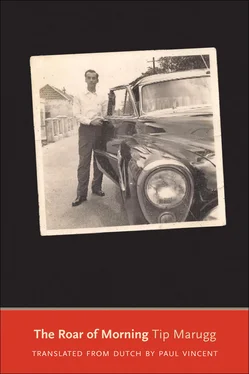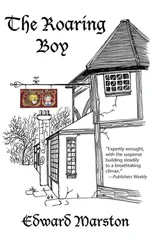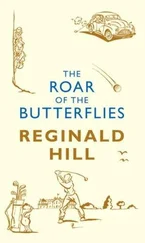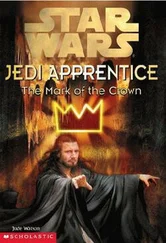Shon Joshi lived in a splendid white mansion with a massive roof, a number of elegant dormer windows, and a raised front terrace flanked by corner turrets. He had a big turkey farm and every year at Thanksgiving and Christmas he slaughtered hundreds of birds and sold them to the tourist hotels.
We climbed over the fence and crept stealthily through the undergrowth. “It takes longer from this direction,” explained Cinto, “but it’s safer. If you walk into the wind the dogs can’t catch your scent, and if we don’t make any noise they won’t notice us.” We crept behind the long row of cages. It was the first time I had seen live turkeys. I thought they were hideous, with their swollen combs and wattles and their dreadful high-pitched squawks. When we got closer to the house, we looked for a well-camouflaged spot from which to survey the terrace and wait until Shon Joshi emerged. “He’s got at least ten or twelve maids,” said Cinto, “all of them sixteen or younger. The men who feed the turkeys and clean out the cages are never allowed in the house, and if they trespass they’re sacked and kicked out. Look, there he is!”
I had expected a giant of a man, an imposing figure bulging with muscles, but Shon Joshi turned out to be a short, puny creature, dressed in an immaculate tropical suit that seemed too big for him. On his neck I could see red combs and wattles, smaller versions of the ones on his turkeys, and there were brown lumps on his cheeks and forehead. He walked up and down the terrace a few times with a cautious, mincing gait, then looked up at the hot sun, took out a white handkerchief, wiped the backs of his hands with it and quickly disappeared back into the house. “Come on, let’s get out of here,” whispered Cinto almost triumphantly.
“My leg’s gone to sleep, I can’t get up yet,” I lied. “I’ll come along in a minute.”
This was because at that moment I felt the strange dizziness in my head. I was now in the house following Shon Joshi down a long passage. He was no longer the seedy little man I had seen a few minutes earlier, but a handsome eastern prince, complete with moustache and short beard. When he reached the end of the passage he opened a heavy oak door with a bold gesture and strode through. From the room beyond wafted a pungent, pleasant perfume that I inhaled deeply. I too was an Arabian prince, clad in a colourful costume with sleeves that were much too wide and wearing a winered turban secured by a golden clasp on my head. As I stood in the doorway, I was obliged to give my eyes time to adjust to the semidarkness. Although there was an enormous chandelier with at least a hundred slender branches hanging from the ceiling, none of its lamps gave more light than a candle. I was in a very large chamber, whose four walls were hung with patterned curtains and rugs with scenes woven into them that made me blush. The floor was strewn with huge, plump cushions, and I blushed even more when I saw the scantily clad young women sitting or lying on the cushions in shameless poses. But I plucked up my courage and, ignoring the leers of the sprawling girls, marched determinedly between the cushions to the back of the room.
There sat Rosamaría, Cinto’s sister, who was four years older than him. She had constructed for herself a kind of armchair out of salmon-pink cushions and she half-lay and half-sat upon it, in exactly the same position I had seen her in that morning, in a hammock on the small terrace in front of her parents’ house. At the time she had looked at me with troubled but kind eyes, and I even thought I saw a faint smile on her lips. Now she was sitting with her face to the wall, and I concluded from this that she was desperate to keep apart from the other girls. I stood behind her, leant forward a little and saw through the semitransparent fabric that swathed the outlines of her mysterious brown body. Embarrassed, I stepped back and lowered my eyes, but immediately afterwards I took another look. I stretched out my right arm and softly stroked her cheek with the backs of my fingers. I hoped she wouldn’t notice the slight trembling of my hand, and would not turn round and look me straight in the eye. But she remained motionless and I continued to stroke her cheek. Then I touched her ear with my fingertips and ran my thumb along one of her eyebrows a few times. Like that morning, I thought I saw a faint smile on her lips and felt embarrassed and gratified at the same time. Then she leant back further and pressed her head against my chest, which gave me a pleasant tingling sensation.
Outside, the gobbling of the turkeys and the barking of the dogs ceased, and in the sudden silence I was able to distinguish tiny noises. I was still crouching in the same spot in the undergrowth. There was the faint hum of insects in the warm afternoon air, and a smell of dry soil and dead leaves. From the top of a tree came the hesitant cheep of a young bird, fresh from the nest, trying out its voice. A few large yellow leaves, their work done, came spiralling down to cover the nakedness of the forest floor. Close to where I was sitting, a large bush and a dark red vine clung together in a passionate embrace.
It was the first time I had an erection thinking about a girl.
Under the influence of drink, I can look at an animal, a plant or a stone with a child’s eye and suddenly see everything anew, hoping in my befuddled way for a miraculous release that will allow me to start life again with a clean slate. Sometimes alcohol disperses the demons of the night, soothing the exhausting tensions inside me and healing my seared mind, heart and conscience. Unerring as a laser, a healing ray of light falls from the moon’s silver sickle onto my path.
Drink the great healer; the treacherous quack. I’m well aware, even when drunk, that what I’m so eager to clasp to my bosom may be no more than a temporary illusion. An adult can never become free again — he can never shake off the impure things that have attached themselves to his life with their suckers. There is no way back. But I drink, and in my brief intoxication allow myself to be carried back to a period when my life was not yet withered. Otherwise I should have to content myself with the implausibly calm existence of a naïve old man who thinks he should be happy because no great catastrophes have befallen him.
And yet, just as a boy in the process of becoming a man doesn’t know what to do with his arms and legs, which have suddenly grown longer and collide clumsily with doorways, so the adult looking back at his youth staggers under the weight of years. When you are no longer young, everything pristine and untainted is a reminder of death. That’s when my solitary game becomes dangerous.
I sit on my terrace and command the ridges of the hills to stop their grotesque metamorphoses. I order the exotic night birds to cease their hysterical cries. The world becomes silent and motionless, and I try to summon up that dizziness in my head which takes me back to childhood. But the great arch of the sky buckles, the starless heavens have come noiselessly off their hinges and begin to collapse, slowly at first, then faster as if trying to suffocate me. The air becomes compressed between heaven and earth. I’m lying on a hard bed gasping for breath. The pure dream that had begun to emerge disintegrates and I feel a burning fever all over and unbearable pain in my limbs. My eyelids are swollen and my eyes sting. When I half-open them, I’m looking into the ugly features of the curandera , who is leaning over the bed stuffing herbs under my pillow. Then she goes to the foot of the bed and starts smearing a black paste on the soles of my feet.
The moon wind blew for the first time around the middle of the seventeenth century when, by the light of a full moon, the itinerant priest Plácido died a martyr’s death on a limestone plateau on the north coast, slain by a drunken, red-haired mercenary. Ever since, the phenomenon has been repeated in the same place almost every September. There has not been a single family from the village lying at the foot of the plateau that has not had at least one member snatched away by the terrible moon wind and the raging fever it brings. The three shops in the village sell only sombre mourning garb, as no one ever has a chance to don colourful clothes; before the two years of mourning for one victim are up, there is always a new death in the family. No one plays music in their houses or even in the village’s two bars. The men and women wear such surly expressions, and even the children are serious when they play. The late poet Pierre L. once read me a moving poem, an epic without a hero, in which he calls the village successively Village of Mourning, Village without Music and Village without Smiles.
Читать дальше












